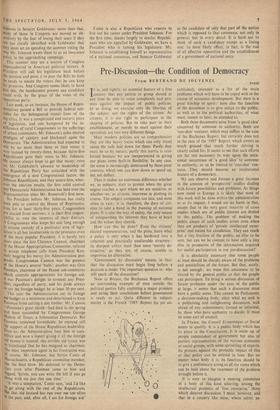Pre-Discussion—the Condition of Democracy
From BERTRAND DE JOUVENEL
PARIS
TT is, and rightly, an essential feature of a free 'country that any person or group should at any time be able to voice complaints and pro- tests against the impact of public policies. In so doing, we exercise only the liberties of the subject, not the rights of the citizen. As citizens, it is our right to participate in the shaping of policies. But to take part in their establishment, or merely to react against their operation, are two very different things.
Most modern policies are so comprehensive they are like heavy trains which can only travel along the rails laid down for them. Partly they must be so by nature; partly this inertia is rein- forced because we are inexperienced in giving our plans some built-in flexibility. In any case, the scene is increasingly dominated by these great convoys, which one can slow down or speed up, but not deflect.
Thus it makes an enormous difference whether we, as subjects, start to protest when the great engine reaches a spot where we are sensitive, or whether we, as citizens, intervene in plotting its course. The subject complains too late, and most often in vain: it is, therefore, the duty of citi- zens to take a hand in the framing of national plans. It is also the way of safety, the only means of safeguarding the'interests they have at heart and the values they cherish.
How can this be done? Even the citizens' elected representatives, and the press, learn what a policy is only when it has hardened into a coherent and practically unalterable structure: its sharpest critics must then seem `merely de- structive,' as they are, of course, unable to improvise an alternative.
'Government by discussion' means, in fact, that the discussion must begin long before a decision is made. The important question is: who will spark off the discussion?
Now in Britain, the Buchanan Report offers an outstanding example of men outside the political parties fully exploring a major problem and airing their conclusions before government is ready to act. Quite different in subject- matter is the French '1985' Report (as yet un-
published), intended as a list of the main problems which will have to be coped with in the course of economic development. But there is a great kinship of spirit: here also the function of the document is to give notice to the public, as well as to thi political authorities, of what must, sooner or later, be attended to.
Both these documents arise from 'a good idea' conceived by someone in authority. Both are 'one-shot' ventures, which may suffice in the case of the Buchanan Report, but certainly does not in the case of the '1985' Report, which covers so much ground that much further delving is clearly called for. It seems to me that such efforts are far too necessary to wait upon the occa- sional occurrence of 'a good idea' to someone • in authority, or to be limited to 'one-shot' ven- tures. They should become an institutional feature of a democracy.
We can observe and foresee a great increase in the amount of 'prospective' studies dealing with future possibilities and problems. As things now stand in Europe it is likely that most of this work will be done within the administration or at its request. I would see no harm in that, except that in the very great majority of cases studies which are of public interest are denied to the public. The problem of making the public aware of such studies arises even when they are products of 'private intellectual enter- prise' and meant for circulation. They can reach but a tiny fraction of the public, an elite to be sure, but can we be content to have only a tiny elite in possession of the information required for useful participation in our pre-discussion?
It is absolutely necessary that some people at least should be sharply aware of the problems and possibilities of the future. But that, surely, is not enough: we want this awareness to be shared by the general public so that the people can participate. To bring a serious discussion of future problems under the eyes of the public at large, it seems that such a discussion must have a public arena. This cannot be Parliament, a decision-making body, since what we seek is a publicising and enlightening discussion, well ahead of any commitment, formal or informal, by those who have authority to decide. It must be some sort of council.
In France, the Conseil Economique et Social seems to qualify. It is a public body which has its place in the Constitution. It is made up of people independent of government but also of parties; representatives of the various economic or social groups, with some sprinkling of experts.
Its protests against the probable impact of this or that policy can be uttered in time. But no matter what body it is. its function should be to give a preliminary airing to all the views which can be held about the treatment of the problem brought before it.
It is easy to imagine a steering committee of a body of this kind selecting, among the intellectual products of 'free enterprise,' those which deserve discussion. I must, however, add that in a country like mine, where talent, re- search and data are, to the highest degree, con- centrated in the administration, it seems hardly avoidable that these resources should be called upon for the studies of the future. Hence there is a strong case for an agency sufficiently public in character to draw upon these resources. It is conceivable that a public body, independent and neutral, should be set up by law, to procure the exploration of long-range possibilities and prob- lems: it would promote or support studies of the future, and fit them for discussion, thereby acting as regular supplier of the discussing coun- cil, which should, however, be free to place on its agenda studies of different origin.
Now, if we recapitulate, we find a new sequence in the matter of public decision- making. First, an exploration of the problems to come, promoted by a variety of bodies, which may include an independent public agency. Second, a public discussion by a council which has a place in the Constitution, whose members are not chosen by government, but represent yarious interests or possess various forms of expertise. Only after such discussion, and on the basis of what has come to light, does the Govern- ment evolve a national plan. The Opposition is possessed of the same data, and as well placed as the Government to draw up an alternative.
In this way the key issues would always be brought out. They would restore meaning to par- liamentary discussions. Members of Parliament are no more omni-competent than any of us. In a complex plan they are apt to attack what seems unimpeachable to any expert, sometimes what logically follows in a technical structure from something they do accept or want. In a complex plan there is a mass of technicalities, within which are hidden away the few issues properly a matter of political choice. Many of these issues on which we may usefully proceed to a weighing of preferences are not necessarily points on which ancient party doctrines determine an atti- tude a priori. Thus, parties will find themselves moving out of traditional ruts.
None of this is at all Utopian. In fact, all of it has begun to occur.































 Previous page
Previous page